- Home
- Chris Wraight
Vaults of Terra: The Carrion Throne Page 12
Vaults of Terra: The Carrion Throne Read online
Page 12
Of course, ‘new’ was a relative term. No cathedrals had been built on Terra for over four thousand years. Keeping the old ones from falling in on themselves was task enough for the millions of Ecclesiarchy work-gangs, toiling eternally in the crypts and the aisles and the slowly sinking foundations while the priests swung censers and slaughtered offerings on their ancient altars.
‘I wonder, Revus, if anyone noticed,’ mused Crowl, watching the hump of the Palace’s distant parapets slip out of view, ‘when we stopped building.’
Revus, sitting opposite him in the Nighthawk’s cramped interior, grunted something noncommittal. Gorgias, dormant for the moment, hovered inert at the rear of the chamber, occasionally bumping into the inner hull-beam as the craft moved.
Crowl turned to his captain. The red light slanting in through the viewports made his face look more damaged than it was. ‘Oh, don’t take it so hard. I think he actually liked you.’
Revus grimaced. ‘I thought they never left the Palace.’
‘So did I.’ Crowl sat back in the metal harness, pulling his cloak over his knees. ‘And what do we make of that – a Custodian outside the walls, hunting a missing brother of the ordo. I don’t think I quite believe it.’
Revus nodded, and rubbed his jawline. The bruising was steadily creeping across his stubble-hard chin, making the pale flesh look more tattooed than it was.
‘And who cares about Hieron Valco?’ Crowl went on. ‘Seriously, who cares about Hieron Valco? There must be a hundred bodies washing around down in the sewers that never get found. And now we chase down one, just one, and the bloody gods of old come back to stalk us.’
‘Rhadamanthys,’ said Revus.
‘What?’
‘Rhadamanthys. A name. I found it in Valco’s hab-unit.’
‘Did the arbitrators take that from you?’
‘No.’
‘That’s something, then.’ Crowl thought on it for a moment. ‘The orbital quarantine, that’s what the Custodian was interested in. Maybe we don’t need Valco’s complete records. Maybe that’s all the information he thought was important. It’s a ship.’
‘Heard of it?’
‘I’ll have a scan run of transporters waiting for dispatch. You never know.’
Revus nodded. ‘You’re sure? It could be a person.’
‘Or a weapon, or pet canine, but, no, no, it’s a ship. That’s what Valco did. That’s all he did, his whole life – recording ships. Getting killed was the most interesting thing that ever happened to him.’
‘And by someone who could get the body into an Inquisition morgue.’
‘You think it was Phaelias?’
‘No idea.’ Revus winced a little as the Nighthawk banked, cutting the restraint-straps into his wounds.
‘Nor I,’ said Crowl. ‘But I shall have to enquire further about this inquisitor, in whose name so much effort has been expended.’
‘Maybe Spinoza knows of him.’
Crowl gave an equivocal expression. ‘Maybe. I’ll ask her.’
Outside, the sky was steadily darkening. It was still hours before dusk, but the pyres were beginning to have a cumulative effect, ushering in an unnatural sunset to precede the real one. Calls to prayer blared out across the fading skyline, tinny from the vox-augmitter banks used by the priests, overlapping one another and mingling with the dolorous clang of great bells.
‘Have you told her yet?’ asked Revus.
‘Told her what?’
‘Why you wanted her.’
Crowl drew in a long breath, and listened to the fervent clamour. ‘I don’t know why you think I would.’
Revus didn’t look like he agreed, but made no objection. Ahead of them, the hive-spires flanking Courvain came into view, grimy brown against the smear of the ash-filled sky beyond. The Inquisition fortress itself hunkered down between them, dark as tar, shunned by the otherwise congested air traffic lanes.
‘We lost two of Hegain’s command,’ Crowl said, his voice low.
‘I know.’
‘If they have living relatives in service, let me know.’
‘I will.’
‘And yourself, Revus? They told me you were not mistreated.’
‘I’ll be fine.’
Crowl nodded, still looking out of the viewports. Courvain was looming before them now, its turrets glinting from the pyres, its armoured windows gaping like pits into nothingness.
‘I’ll think about telling her,’ he said, watching the hangar doors swing in closer. ‘When all this is over.’
Spinoza studied for the next three hours, locked in her cell, surrounded by the sheaves brought up from the archives. Huk was right – Quantrain appeared in a vast number of cases. He had been decorated for service many times, always in ceremonies held in the Inner Palace. The hierarchy of the Inquisition was an exercise in gathering obscurity – the more senior an operative became, the less they were visible, retreating into a subtle world of quiet conversations in gilt corridors and rumoured interventions over formal dinners. Quantrain had reached this apotheosis, it seemed – a player of the great games within the Sanctum Imperialis itself, operating through a network of capable agents, no doubt furthering a gradual move on the ultimate goal of a place on the High Lords’ council table as Representative.
If Quantrain was an arachnid-like figure, then his aides were all too visible, Gloch foremost among them. Perhaps, given a dynamic enough master, she could aspire to similar levels of notoriety. Despite all the coded jealousies in the files, it was clear to her that Gloch was admired. Quantrain was admired. Tur had been, too.
The chime at her door went off, and she jerked her head up, dragged from soporific and dangerous thoughts. How long had it been since she’d slept?
‘Come,’ she said, pushing the paperwork aside and rising from her study-unit.
The door hissed back to reveal a familiar silhouette, just as dark, angular and rangy as it ever was. At least the damned skull wasn’t hovering over his shoulder, although perhaps that demented soul spoke more truth than either of them.
‘I’m sorry, Spinoza,’ Crowl said, stooping to enter. ‘Truly sorry.’
That wrong-footed her. ‘Ah, for–?’
‘You never received your promised support.’ Crowl stalked over to her cot – the blankets pulled tight, the devotion-books placed neatly on the thin pillow – and sat on the edge. His long hands flexed as he gestured for her to sit, then placed them on his knees. ‘You probably heard – Revus ran into trouble, and it took me away.’
‘I do not expect you to chaperone me, lord.’
‘It’s a twisted thicket out there, Spinoza. One path leads into another, and then to nowhere, perhaps, and then back out again.’ He looked at the stacks of parchment. ‘Extra study?’
‘I encountered one of Inquisitor Quantrain’s agents.’
‘The giant?’
‘Aido Gloch.’
‘They must have fed that one grox-flesh as a child. Wholly unnatural. What did he want?’
‘The woman – the target of the pursuit – they call her Falx, and they are hunting her too. She is one of the cabal, connected to its masters, so he said.’
‘I don’t suppose he offered to join forces?’
‘I did not raise it.’
‘Good. This will not be a priority for them. Quantrain has fingers in all sorts of places, but I doubt he’d ever show his face down here. Although, you can never be sure who’ll suddenly come out of the tunnels.’ Crowl smiled ruefully. ‘See, I met a Custodian today. The first of my life, and in all probability the last.’
‘I thought they never–’
‘Yes, it’s been a day of surprises. And that’s why I needed to speak to you.’ Crowl leant forwards, and appeared to wince as his shoulders moved. ‘These gangs, they’re killers and I wish to run them down just as
much as you, but something else is happening. Revus has been doing some work for me after an unusual object turned up in a processing morgue, and it’s begun to worry me. There was a body, a scribe charged with recording landing records, and something he noticed seems to have got him quite badly killed. We have the name of a ship, one he thought was important, and I need to look into it. One of my colleagues from the Ordo Xenos had the same thought and has now disappeared too – hence the appearance of this Custodian, who would not tell me precisely why he was taking an interest in all of this, which is to be expected, but makes me worry even more.’
Spinoza took it all in. ‘Do you have a location on the ship?’
‘It’s called the Rhadamanthys, and it’s still at low anchor. It achieved orbit nineteen standard days ago and is due for departure in three weeks. I’ve been doing my own studying. From what we can tell, it’s totally unremarkable – a deep-void bulk carrier owned by a major import cooperative and chartered to the Guilles Frethe corporation. I’m aware of no great corruption in this organisation, beyond the usual necessary to turn a living. Their proctoress-ordinary has been conducting an affair with a canon of a Ministorum compliance chapter for two years, and there are staff members with close links to cartels controlled by the Chartist Speaker, which all seems prudent enough if you want to negotiate landing permits. But that’s the name we have. It’s all we have. I want to take a closer look.’
Spinoza looked down at the floor. ‘And you wish for me to join you?’
‘Yes, that would be good.’
Despite herself, that was welcome. ‘And the Angel’s Tears?’
‘They’re important, like I say, but what leads do you have, right now?’
‘There is work to be done.’
‘Exactly. And I could use you, Spinoza. I could use that damned maul, which I suspect you wield quicker than anything I could.’
‘I do not wish this Falx to evade me,’ said Spinoza.
‘Understood, but do not let it become personal. They win a small victory every time they insert a splinter under our nail. You understand?’
‘She is dangerous.’
‘So are you.’
Spinoza looked up again, and met Crowl’s steady grey eyes. ‘What do you hope to achieve?’ she asked.
‘I have no idea. Maybe nothing. Maybe everything. That’s the chance of it.’
It was impossible, just then, not to contrast that with how Erastus had been. A Space Marine was a soldier, and everything he did was as a soldier did – objective defined, target isolated, result understood. This was speculation, hunches, based on little more than a feeling. Perhaps that was how it had to be, though she doubted Tur would have agreed. Different wars, different tactics.
‘But you must have some idea,’ she said.
Crowl hesitated before replying, as if weighing up how much to take her into confidence. ‘The Custodian didn’t say much,’ he said eventually. ‘Only that the elect of the Ministorum will reach the Eternity Gate in four days. Why did he say that? I don’t know. Everyone on Terra is aware. There will be millions there to see it, and hundreds of thousands of guards watching them, and guards watching the guards. The Companions will be there, Titans and enforcers and assassins. It will be the most absurdly militarised point in the galaxy for that one day, and you would have to be quite insane to contemplate taking advantage of it.’ He met her gaze, and his own was as hard as ouslite. ‘But then, there’s a lot of that about.’
‘They are getting weapons,’ Spinoza said.
‘From somewhere, yes. But would it not be the greatest of chances, if our friends in the Angel’s Tears were connected to this new thing? That would be neat and helpful, and I don’t think life is neat and helpful. It’s never been that way for me, anyway.’ Crowl exhaled, and his tight cheeks flexed, betraying the fine-lined limits of rejuve therapy. He got up, pulling his cloak around his armour. ‘I have a transport being primed. Will two hours rest suffice?’
It wouldn’t. She was still suffering the effects of the long warp passage, exacerbated by the exertions of the past few days, compounded by the enervating effects of Terra’s destructive environment. Ten hours would not have been enough.
‘I will be ready, lord.’
‘Cro–’ he began, then smiled in defeat. ‘Very well. It’ll be good to have you with me.’
Then he was gone, limping through the doorway with a brush of cloak-hem and a thrum of power armour.
Once the door was closed, Spinoza looked over at the cot. The pristine blanket had an indentation on it now, a faint rumple in the coarse wool. That might have been an irritant, had she planned on making use of it. But that had never been her intention.
She pushed the parchment stacks aside, the ones from the archives that she had been willing to show her master. Underneath were the folios given to her by Rassilo.
‘Enhance,’ she commanded, and the overhead suspensor lumen swelled into brightness, illuminating the script of a tattered leaf entitled ‘Crowl, E., O.H. – What We Know, and What We Do Not.’
Spinoza leaned forwards, resting her elbows on the metal slab, and resumed her study.
Chapter Eleven
Making the leap from solid earth and into the void beyond had once been beyond the dreams of the insane. Generations of soil-dwellers, scratching about amid the dirt of aeons, prisoners of gravity, had looked up at the stars and called them gods, knowing that they would forever be far out of reach.
No longer. Though so much else had been forgotten, the means to break the bonds of the planetary was still commonplace within the Imperium, so much so that even a modestly endowed mercantile combine would have a dozen system-runners in its orbital sheds, plying the short hop between terrestrial landing stages and local orbit, ready to rendezvous with the true giants of the deep. The atmosphere of the Throneworld was nigh as congested as its urban surfaces, scored and re-scored by the crossover trails of a million near-space vessels. There had ceased to be much significant difference between the atmospheric and the true-vacuum zones – they were just steadily rarefied sections of the same world-city, extending up from the darkest chasms, out beyond the turrets and into the high-air stations, and then further out, back into darkness, up to where the mighty orbital plates slowly gyrated in the harsh light of an unfiltered sun.
A vessel blasted off from a sanctioned landing site on Terra every millisecond, so they said. Another landed to take its place not long after. They arrived full, they left empty. The Throneworld did not trade with the rest of the Imperium – it consumed it. Goods were sucked in from every corner of every segmentum, dragged out from the holds of the leviathans that carried them, seized by the ravenous populace and devoured, and it was never enough. A million cargo-lifters might touch down in a single hour, and still thousands would starve. Any delay in the endless circular passage, and tens of thousands would die. Like a hopeless opiate addict, the populace could never be satisfied, never given enough. The birthplace of humanity now squatted like some obscene, famished infant at the heart of its web of stellar kingdoms, ingesting the last dregs of energy out of the straggling fringes and gulping them down into greedy oblivion.
Courvain’s voidcraft were housed in their own sector of the tower. Crowl maintained two Spiderwidows in his armoury for orbital transit – void-capable Inquisitorial variants of the Storm Eagle gunships used by the Adeptus Astartes. Like all else in his armoury, the vessels were night-black, armoured and emblazoned with the sigils of the Ordo Hereticus. Their marker-lights were a pale blue, the livery picked out in cold silver. A Spiderwidow carried few heavy armaments, lacking space in the enlarged plasma-housing for anything but engines and assorted sensor-baffling archeotech, but retained wing-mounted lascannons and a pair of heavy bolters at the prow.
It was the deep of the Terran night when the main hangar doors kicked off steam, their pistons activated, and drew back. Warning klaxons bla
red out, followed by spinning alert-lumens. Powerful searchlights shot up into the night sky, giving a warning understood by all atmospheric craft in the vicinity.
Seconds later, the Spiderwidow’s turbines roared into throaty life, and it lifted off the apron, its fuel lines and stabiliser cords snapping free. Superheated air thrummed over the rockcrete, and the massive craft roared up and out, tilting on exit from Courvain’s dark flanks and boosting into a steep climb.
Crowl sat back, watching the air traffic scurry to make way. The cityscape was ominous in that light – a wall of sheer black, punctured by the meagre scatter of lumen-points – but it soon fell away, exposing a featureless screen of occlusion ahead.
Spinoza, seated beside her master, watched the vastness of Salvator dropping away fast, a web of gold and yellow, broken only by sporadic plume-flame and the dull glow of active forges. For a few moments, she could make out the glittering margins of the Palace itself on the northern horizon, bathed in a blood-gold aura, its immense walls rising above even the tallest of the surrounding spires.
Then they hit the cloud belt, and the Spiderwidow rocked hard with turbulence. Aneela, Crowl’s pilot, grappled with the control columns, her jaw set hard under the visor of her flight-helm.
‘You’re fine with this, Spinoza?’ Crowl asked, calm as ever. ‘You can say if you’re not.’
The question itself was an insult, but she tried not to let it show. ‘Absolutely.’
‘I’ve had the equipment checked.’
‘Do not be concerned. I have no fear.’
‘Like your old friends. So they say.’
From further back in the cramped cockpit, Gorgias hissed something like a laugh. ‘Timor nullius! Oh, good. Homicidium on the way.’
‘There’s always that chance,’ said Crowl.
The last of the cloud cover ripped away, tumbling behind the Spiderwidow’s punishing backdraught. As the air thinned, Aneela switched power to the plasma drives, and the chassis locked itself into transitional judders.

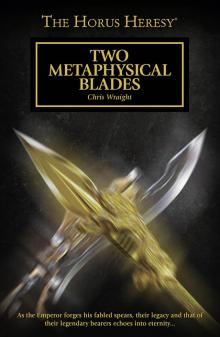 Two Metaphysical Blades
Two Metaphysical Blades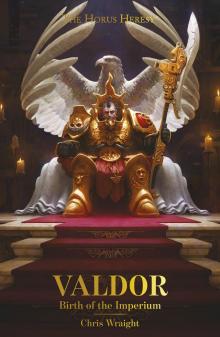 Valdor: Birth of the Imperium
Valdor: Birth of the Imperium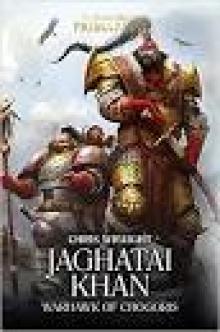 JAGHATAI KHAN WARHAWK OF CHOGORIS
JAGHATAI KHAN WARHAWK OF CHOGORIS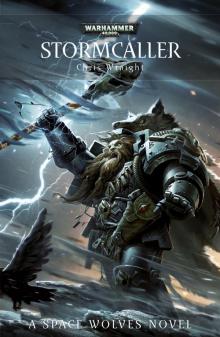 Stormcaller
Stormcaller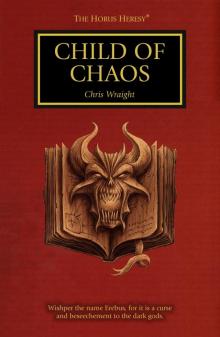 Child of Chaos
Child of Chaos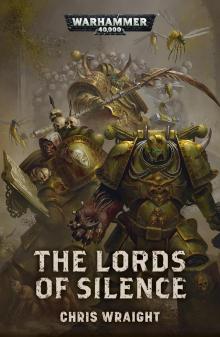 The Lords of Silence
The Lords of Silence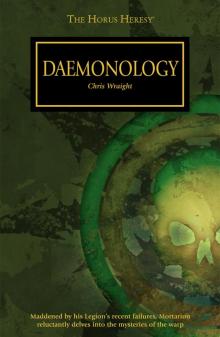 Daemonology
Daemonology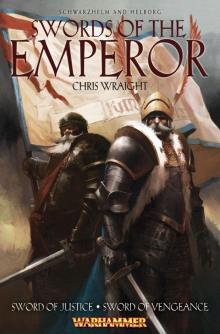 Swords of the Emperor
Swords of the Emperor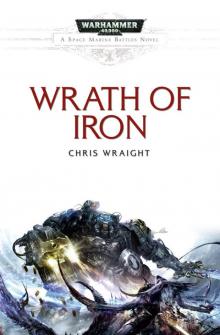 Wrath of Iron
Wrath of Iron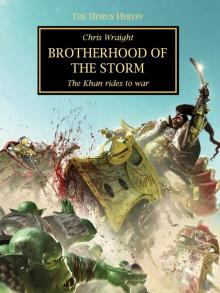 Brothers of the Storm
Brothers of the Storm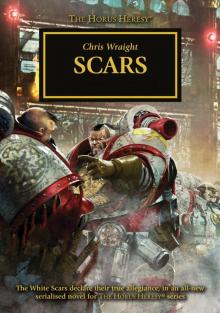 Horus Heresy: Scars
Horus Heresy: Scars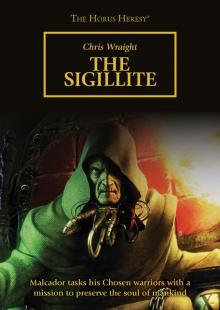 The Sigillite
The Sigillite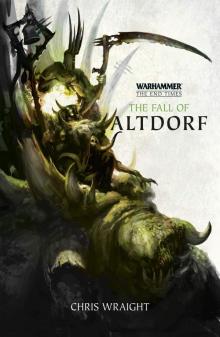 The End Times | The Fall of Altdorf
The End Times | The Fall of Altdorf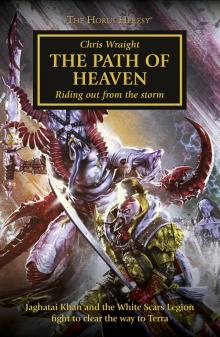 The Path of Heaven
The Path of Heaven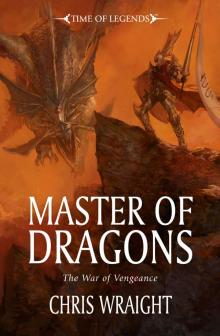 Master of Dragons
Master of Dragons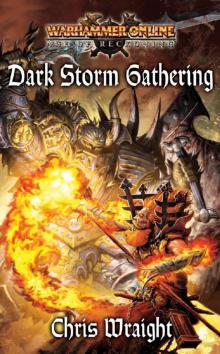 WH-Warhammer Online-Age of Reckoning 02(R)-Dark Storm Gathering
WH-Warhammer Online-Age of Reckoning 02(R)-Dark Storm Gathering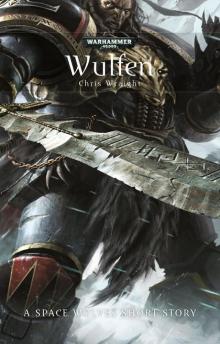 Wulfen
Wulfen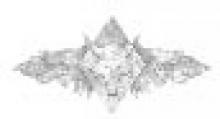 Battle Of The Fang
Battle Of The Fang Onyx
Onyx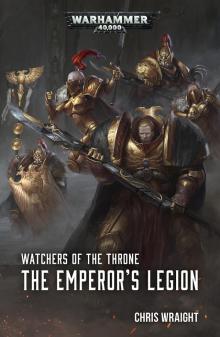 Watchers of the Throne: The Emperor’s Legion
Watchers of the Throne: The Emperor’s Legion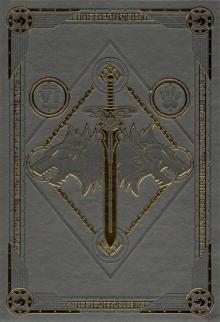 Leman Russ: The Great Wolf
Leman Russ: The Great Wolf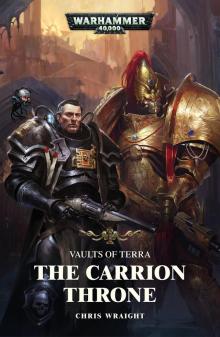 Vaults of Terra: The Carrion Throne
Vaults of Terra: The Carrion Throne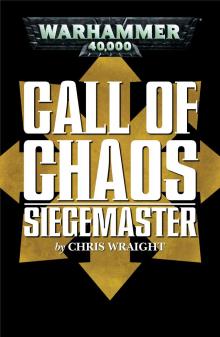 Siegemaster
Siegemaster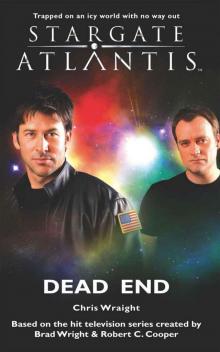 STARGATE ATLANTIS: Dead End
STARGATE ATLANTIS: Dead End Scars
Scars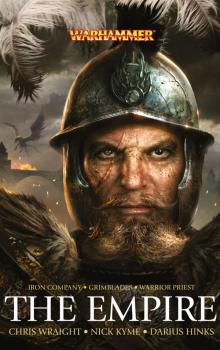 The Empire Omnibus
The Empire Omnibus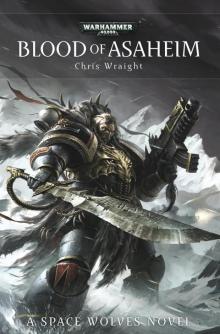 Blood of Asaheim
Blood of Asaheim